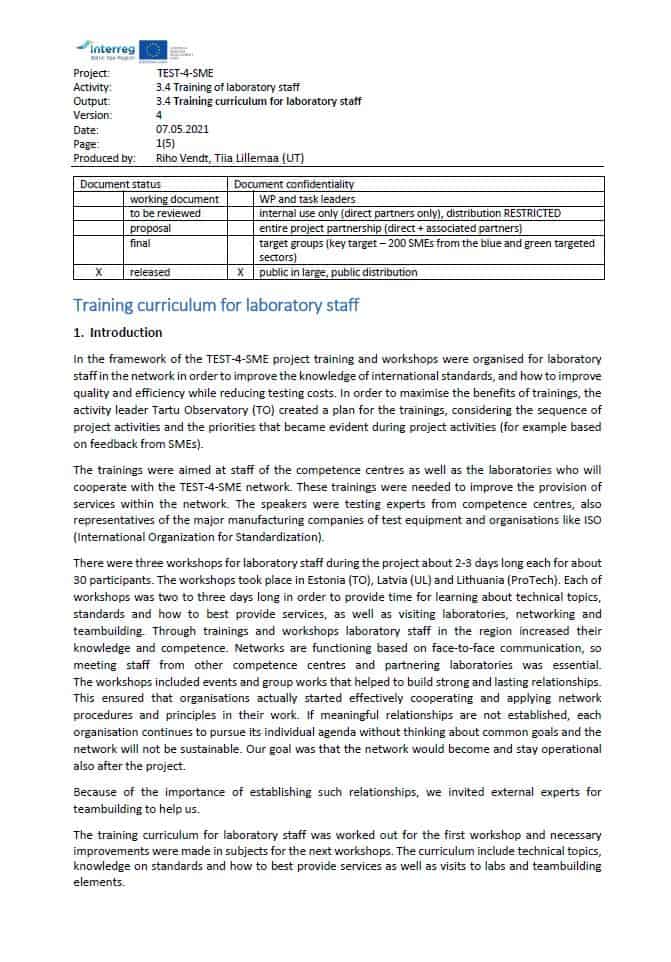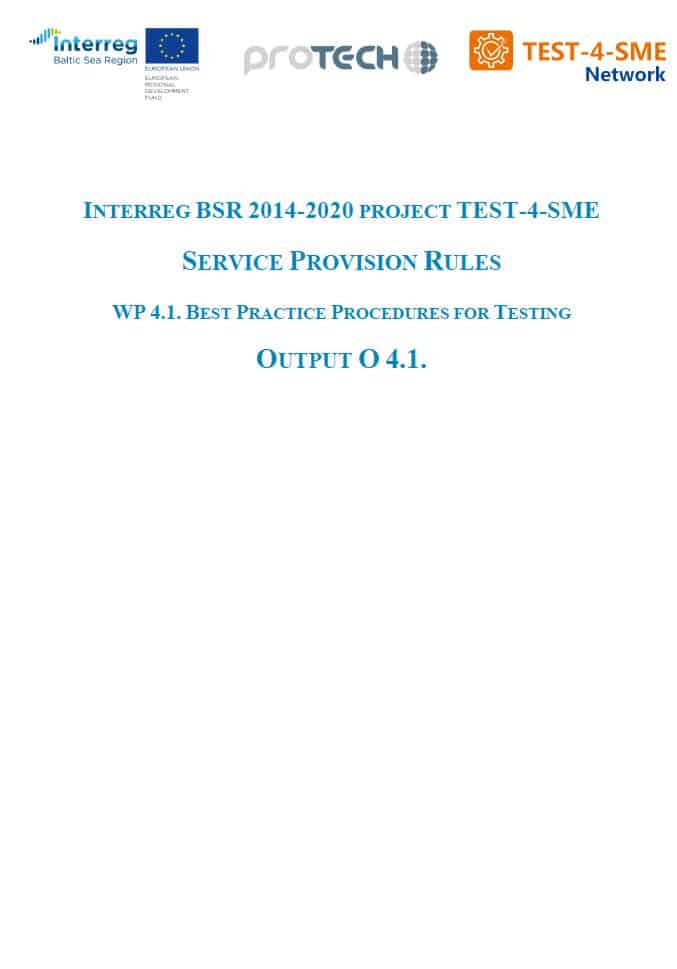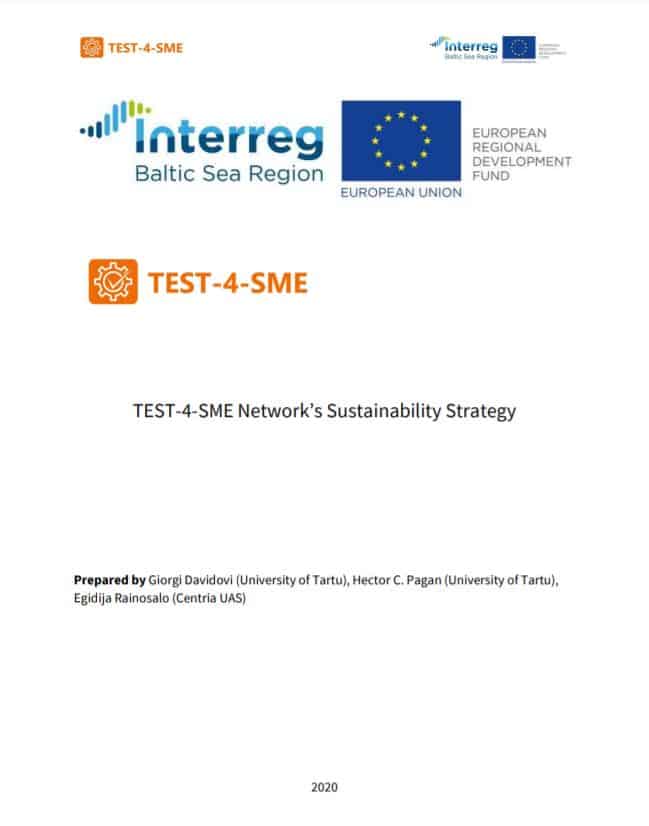TEST-4-SME
New electronic products launched on global markets need to conform to rigorous international standards. Exporting electronics products require compliance with certain requirements before the products are sold. For manufacturers, conformity with standards means extensive testing of prototypes and many adaptations of the product. Early-stage testing allows to avoid failures in later stages and can thus save costs. The testing phase can be long, difficult, and costly for small companies that do not have yet processes in place. The improvement of the quality and efficiency of testing would then help many small businesses producing electronics to speed up the process of product development.
Electronics producing small and medium-sized enterprises (SMEs) across the Baltic Sea region would need support in conformance testing/certification, standardization and entering global markets. More practical training and customized support would increase efficiency and reduce the testing time. As the Baltic Sea region has one of the most robust and competitive business environments in Europe and SMEs stand for its robustness, less costly and more optimal processes are needed.
The project TEST-4-SME aimed at tackling the challenges by engaging electronics producers in training sessions and providing them a framework for enhancing their capacities in testing and standardising.
Budgets
in numbers
-
1.76MillionTotal
-
1.44MillionErdf
-
0.00MillionEni + Russia
-
0.00MillionNorway
Achievements
The TEST-4-SME network brought together 19 easily accessible testing laboratories in the Baltic Sea region and equipped them with the necessary knowledge and procedures to support electronic SMEs. The project mapped the testing services in laboratories in Estonia, Latvia, Lithuania, Finland, and Germany, trained the laboratory staff to support SMEs guided SMEs through the complicated process of developing innovative electronic devices. The laboratories opened their facilities to offer testing services to 138 SMEs.
The project trained also the SMEs that could become customers of the networks’ testing labs. Close cooperation with research institutions was established and the involved SMEs received individual consultations and had a chance to visit the TEST-4-SME network laboratories.
The project made two major investments to fill the gaps. It purchased an electrostatic discharge required for testing any kind of electronic product and a reference solar cell allowing for quantitative measurement of the output power of modules.
The equipment obtained by the project was installed in Estonia. Another piece of equipment, a reference solar cell, calibrated by an accredited European entity along with a software interface was purchased and used by Protech laboratory in Lithuania. The reference solar cell and special software allow quantitative measurement of the output power of modules of any size and geometry.
The TEST-4-SME network reduced the barriers to innovation that electronics SMEs meet in the early product development and testing phases. The collaborating laboratories are working every day towards better, safer, and reliable electronic devices that will serve consumers having as priority sustainable development.
The Interreg project TEST-4-SME used EUR 1.74 million to establish an innovation support network, train the electronics SMEs, provide them with the exchange possibilities, and make the product development processes more manageable.
Outputs
Training curriculum for laboratory staff

Best practice procedures for testing

Sustainability strategy

Project Stories
Partners
University of Tartu
- TownTartu
- RegionLõuna-Eesti
- CountryEstonia
- RepresentativeTiia Lillemaa
- Phone
- E-Mail
- Web
Riga Technical University
- TownRiga
- RegionRīga
- CountryLatvia
- RepresentativeJulija Gusca
- Phone
- E-Mail
- Web
University of Latvia
- TownRiga
- RegionRīga
- CountryLatvia
- RepresentativeDace Grauda
- Phone
- E-Mail
- Web
Ventspils University College
- TownVentspils
- RegionKurzeme
- CountryLatvia
- RepresentativeSergejs Zikovs
- Phone
- E-Mail
- Web
Applied Research Institute for Prospective Technologies
- TownVilnius
- RegionVilniaus apskritis
- CountryLithuania
- RepresentativeDiana Naruseviciute
- Phone
- E-Mail
- Web
Centria University of Applied Sciences Ltd
- TownKokkola
- RegionKeski-Pohjanmaa
- CountryFinland
- RepresentativeLasse Jansson
- Phone
- E-Mail
- Web
Hochschule Wismar, University of Applied Sciences: Technology, Business and Design
- TownWismar
- RegionNordwestmecklenburg
- CountryGermany
- RepresentativeLaima Gerlitz
- Phone
- E-Mail
- Web
JSC Modern E-Technologies
- TownVilnius
- RegionVilniaus apskritis
- CountryLithuania
- RepresentativeVaidvile Ulbikaite
- Phone
- E-Mail
- Web
SIA "JLU Technologies"
- TownRiga
- RegionRīga
- CountryLatvia
- RepresentativeInga Lasenko
- Phone
- E-Mail
- Web
Crystalspace
- TownTartu
- RegionLõuna-Eesti
- CountryEstonia
- RepresentativeJaan Viru
- Phone
- E-Mail
- Web
LTD VIZULO
- TownRiga
- RegionRīga
- CountryLatvia
- RepresentativeIndra Zinkevica
- Phone
- E-Mail
- Web
LCC "CRYOGENIC AND VACUUM SYSTEMS"
- TownVentspils
- RegionKurzeme
- CountryLatvia
- RepresentativeNatalia Banova
- Phone
- E-Mail
- Web
-
Project managerTiia LillemaaUniversity of Tartu, Tartu Observatory
-
Legal representativeSiret RutikuUniversity of Tartu
-
Financial managerCarmen TiimannUniversity of Tartu
-
Communication managerTiia LillemaaUniversity of Tartu, Tartu Observatory



